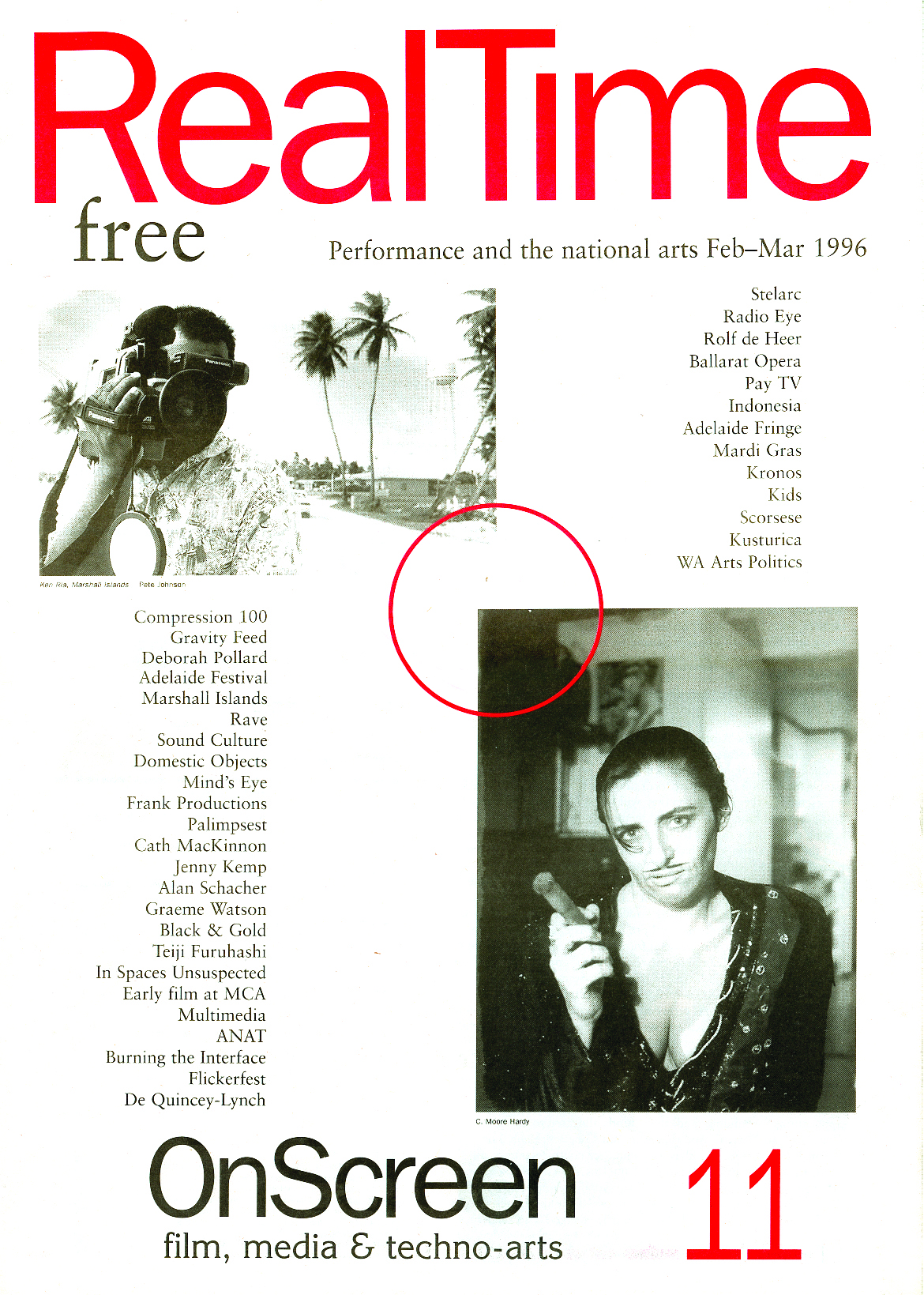
Café spectacle
RealTime Issue 11, February – March 1996, p10
In a picturesque flamboyant port town, a West Australian theatre company has matured into a community asset of cultural significance. Fremantle’s Deckchair Theatre, currently under the artistic direction of Angela Chaplin, is passionately committed to the exploration of “exciting and sensual theatre concepts and cultural images”, with a particular commitment to nurturing women artists and artists from non dominant cultures, as exemplified in their 1995 program: Wildgirl, Sweetown, Diving for Pearls and Tiger Country. Their ground breaking production Ningali began touring both within Australia and internationally during 1995, culminating in a Fringe 1st award for outstanding new production at the Edinburgh Fringe Festival. Ningali recently performed to capacity audiences for the 1996 Festival of Sydney.
Deckchair Theatre was founded in 1983 by Di Shaw and Brian Pedie at a time when figures released by the Australia Council showed that less than 7% of the Australian population went to the theatre. “We felt that theatre wasn’t relevant to real people in Australia. Most plays were about white middle class people and most were written in England and white middle Australia,” remembers Di Shaw. “It was limiting because they didn’t reflect Australia’s cultural diversity. They were also performed in venues where a lot of people were uncomfortable simply because they didn’t and don’t understand the rituals—when to clap, what to wear—these are rituals that only certain people have access to.
“We wanted to avoid theatres and instead perform in public spaces where people already gather—spaces which were important to people—interesting spaces where people wouldn’t expect to see theatre so they would come with curiosity.”
Deckchair’s first major production, Fleets of Fortune, emerged out of the chaos that was the victory of ‘the winged keel’ in Newport, Rhode Island and the consequent refurbishment of Fremantle in 1983, and it was performed under the stars at the Fremantle Arts Centre. Di Shaw met with much opposition from the state funding body: “The drama officer at the time thought I was foolish to be using so much of the company’s resources on this production, feeling that we should do something safe—something we wouldn’t lose money on. But I wanted to express aspects of Fremantle’s local identity so we did it and it was a huge success”.
Each year since, Deckchair has undertaken a major production for, about, and involving their local community. Promenade theatre and the animation of public spaces have been effective tools for celebrating Fremantle’s cultural mix while effectively uniting its diverse demographics. Their community production for 1995, Cappuccino Strip, wove these transcultural threads into a dynamic piece of promenade theatre which explored “the wonderland of coffee cups and chaotic cafe culture”.
Di Shaw returned to Deckchair as the Associate Director (with Angela Chaplin) on Cappuccino Strip with a strong background in, and views on cultural community development. The merging of art, economics and public spaces—according to Di Shaw—has “injected profound change in the treatment of community based projects”.
Performers and audience met on the platform at Fremantle Railway Station guided by the glorious sounds of The Joys of the Women choir. Actors Rose Lenza, Steve Shaw, Peter Findley and Jackie Kerin led audiences on a historical, cultural and theatrical journey through the streets of Fremantle, weaving their way through plazas, malls and coffee shops.
Aside from the four professional actors and musician, this exciting piece of theatre featured three choirs, a young dance ‘crew’ and initiatory aprons for the audience (you had to be there…). Cappuccino Strip adopted an interactive, democratic and celebratory approach to contemporary theatre. Open community workshops and extensive research provided a richly textured script taking as one key focus the life of Italian immigrant, Nunzio Cumina, who introduced Fremantle to the art of drinking coffee on the sidewalk.
Cappuccino Strip concluded with a parade by audience and cast members through Cappuccino Strip itself—the main drag in Fremantle—carrying large papier maché coffee cups on litters and singing an ode to the joys of cappuccino, macchiato, cafe latté and the long black. Apart from the general silliness and fun of taking over the street, the parade made reference to three major cultural events in Fremantle: the Blessing of the Fleet, the Festival of Fremantle Parade and the May Day March.
The rewards of working with a community active in its own decision-making processes are both subtle and profound—celebrating the cultural differences but simultaneously bridging the needs of sub-cultures. Festivals, parades, performances are all cultural rituals which can reclaim the streets with dancing, laughter, and innovation—the taking over of space.
–
Veda Dante is an electronic media journalist and media consultant resident in Perth.






